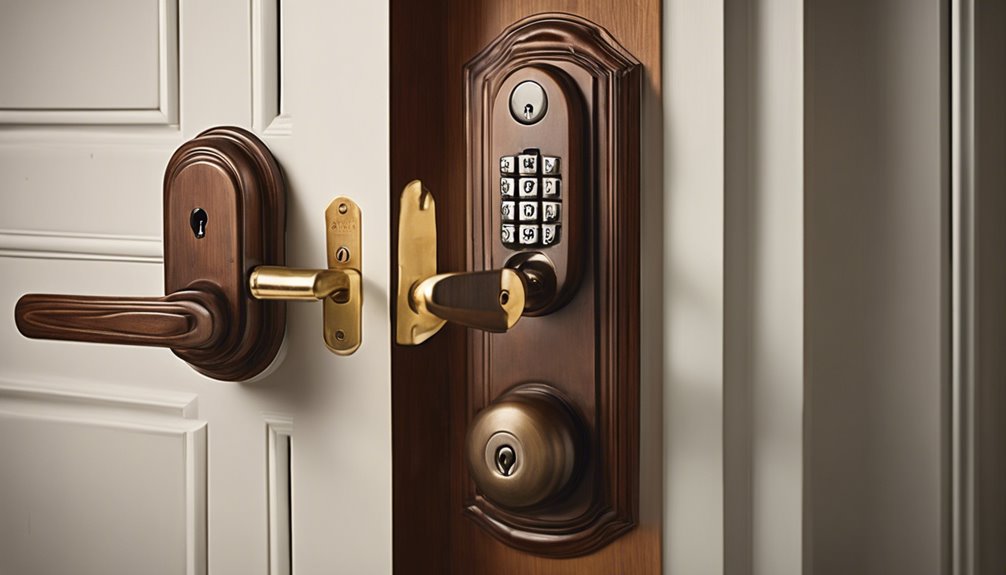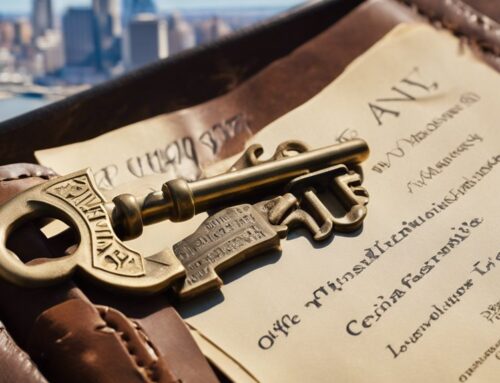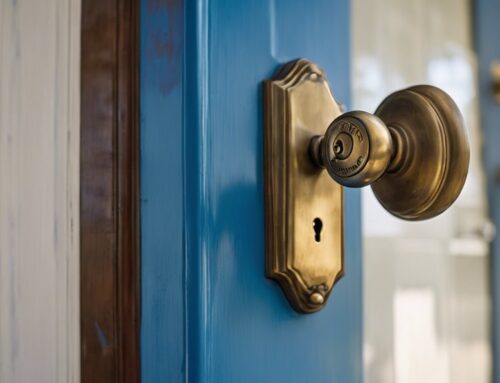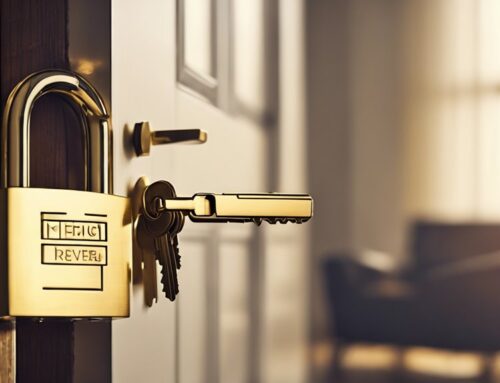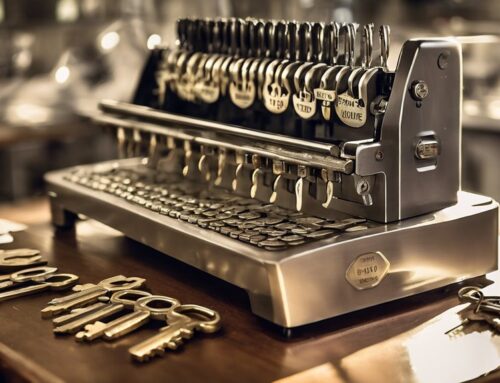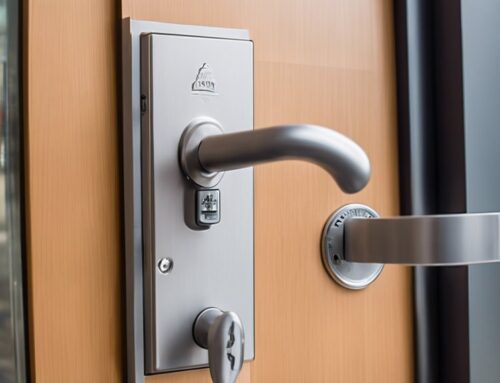Think of a modern-day castle; its strength lies not just in its walls but in its locks. You might be surprised by how New Jersey's safety standards for commercial and residential locks play a vital role in fortifying both private and communal spaces. These regulations are designed to bolster security, but do you really know what they entail? From main entrance requirements to ADA compliance, the specifics can be intricate, raising questions about what you should prioritize for your own property. Understanding these standards is essential for safety and legal adherence, but there's much more at stake.
Key Takeaways
- New Jersey mandates heavy-duty dead-latching locksets for main entrance doors, ensuring security and compliance with ANSI/BHMA standards.
- Commercial properties must undergo regular inspections of locks to prevent tampering and ensure functionality and compliance with security requirements.
- Self-closing and lockable features are required for common area entrance doors and basement/cellar doors to enhance security measures.
- Window guards must prevent openings exceeding 4 inches, ensuring safety in residential properties, particularly for children.
- Compliance with ADA standards is essential for accommodating individuals with disabilities in both commercial and residential settings.
Overview of Safety Standards
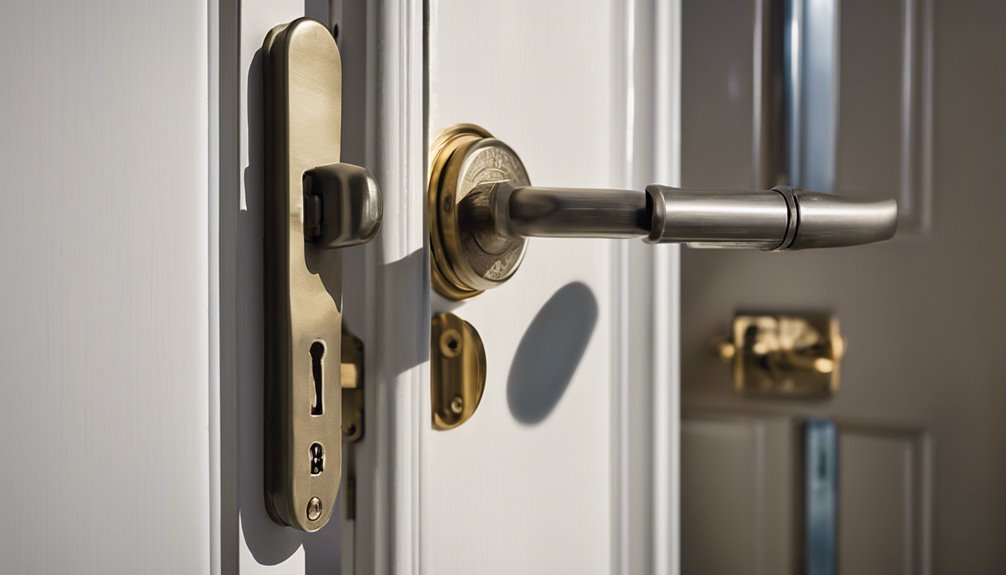
Understanding the safety standards for locks in New Jersey is vital, especially if you're involved in the management of communal living facilities. These regulations aim to enhance security while guaranteeing resident safety and accessibility. Proper locking mechanisms are essential in communal areas; devices like chain locks and padlocks are prohibited if they obstruct exits. That emphasizes the importance of unobstructed emergency exits in facilitating swift escape during crises. Additionally, businesses must ensure that their locks comply with ADA compliance standards to accommodate individuals with disabilities. High-security locks in New Jersey must meet specific standards to ensure they provide adequate protection.
In Class III facilities, room doors must be lockable from the inside by residents but remain accessible to staff with an available key. This dual-access approach protects residents' rights while allowing staff to respond quickly in emergencies. Furthermore, it's crucial to ensure that access regulations are adhered to for promoting resident safety.
Additionally, security protocols must prevent unauthorized access to storage areas containing hazardous materials. Only those with necessary responsibilities should be allowed entry, reinforcing safety while minimizing risks.
You should also guarantee hallways and corridors remain clear of obstructions and storage. This promotes safe passage and compliance with safety standards.
Regular inspections of locking devices are paramount to detect tampering and maintain proper function. Implementing viewing devices or chain door guards might be required to fortify security in specific facilities.
Exterior Door Lock Requirements
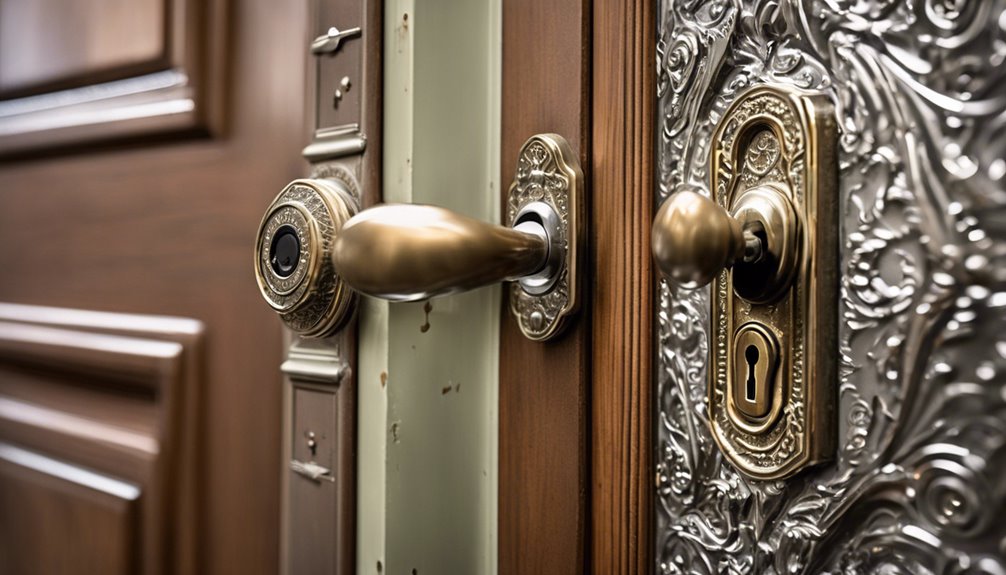
How do New Jersey's requirements for exterior door locks guarantee safety and security? By enforcing rigorous standards, these regulations guarantee that your entrances are fortified against unauthorized access. For main entrance doors, heavy-duty dead-latching locksets are mandatory, adhering to specific ANSI/BHMA A156.2 Grade 1 standards. Not only must these locks have a significant throw bolt, but they should also be self-closing and self-locking—key features that enhance security. Additionally, common area entrance doors must be self-closing and lockable to ensure that these areas remain secure at all times. In New Jersey, it is important to note that tenants have the right to change locks under certain circumstances, such as in cases of domestic violence or when a roommate moves out, provided they give the landlord a key.
Lock requirements extend across various building types. Here's a concise look at the specifics:
| Door Type | Lock Requirements | Additional Features |
|---|---|---|
| Main Entrance | Heavy-duty dead-latching lockset (series 161) | Self-closing and self-locking |
| Common Area | Self-closing and lockable | Keep closed except when in use |
| Basement/Cellar | Must be self-closing and lockable | Viewing devices if visibility obstructed |
| Dwelling Unit Entrance | Medium-duty dead-latching lockset (series 160) | Chain door guard and viewing device |
| Windows and Sliding Doors | Must have locking devices | Grilles lockable from inside only |
Additional security features such as electrically operated systems and non-removable hinge pins for exposed hinges further strengthen this mandate. Locksmiths in New Jersey must undergo a licensing process to ensure they understand and can implement these security standards effectively. Together, these guidelines create a thorough framework designed to promote safety, making New Jersey residential and commercial properties less vulnerable to intrusions, enabling residents to enjoy their freedom with peace of mind.
Interior Door Lock Specifications
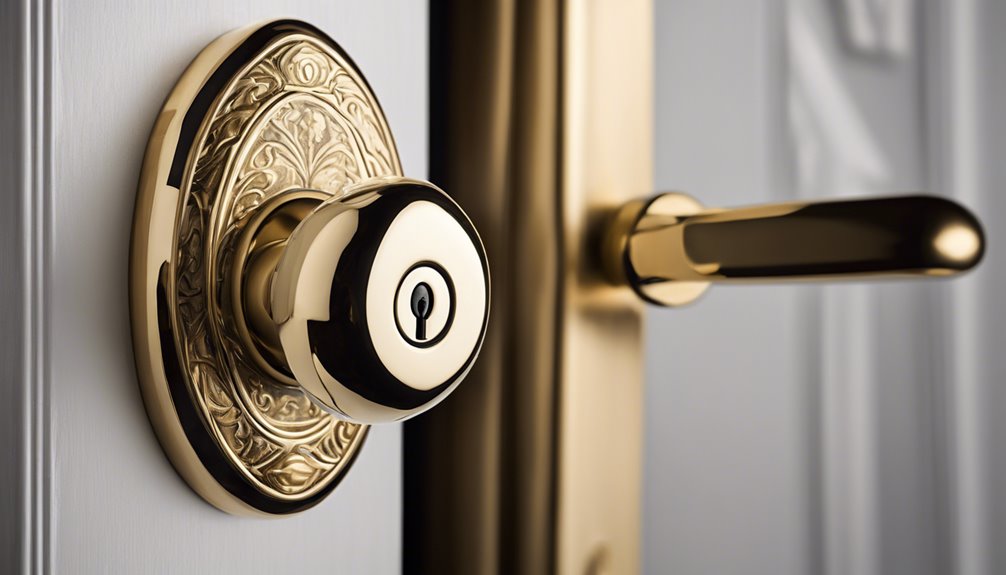
When it comes to interior door locks, New Jersey mandates stringent specifications to guarantee safety and security in residential settings. These regulations are designed to confirm that both residents and their personal belongings are adequately protected. It is important to note that lock rekeying laws in New Jersey also play a crucial role in ensuring tenant safety and security. Additionally, key duplication laws dictate that only authorized individuals may request copies of keys, further enhancing security measures.
When you implement these requirements, you'll not only comply with the law but also foster a secure living environment.
Here are three essential specifications for interior door locks:
- Lockset Requirements: Every entrance door to a rooming unit must have a medium-duty dead latching lockset. It should adhere to ANSI/BHMA A156.2 Grade 2 standards, equipped with an automatic dead-locking plunger and a throw latch bolt measuring at least 11/16 inch by 1/2 inch. Dead-latching locksets are critical for ensuring enhanced security.
- Access Control: Residents must receive a key to their room at no cost, while replacement keys are available at a nominal charge. Importantly, the keys for common areas should differ from individual unit keys to bolster security.
- Maintenance and Emergency Access: Regular maintenance of locks is vital. Non-removable hinge pins on entrance doors and the provision of a master key for emergencies guarantees prompt access for authorized personnel when needed.
Window and Sliding Door Security
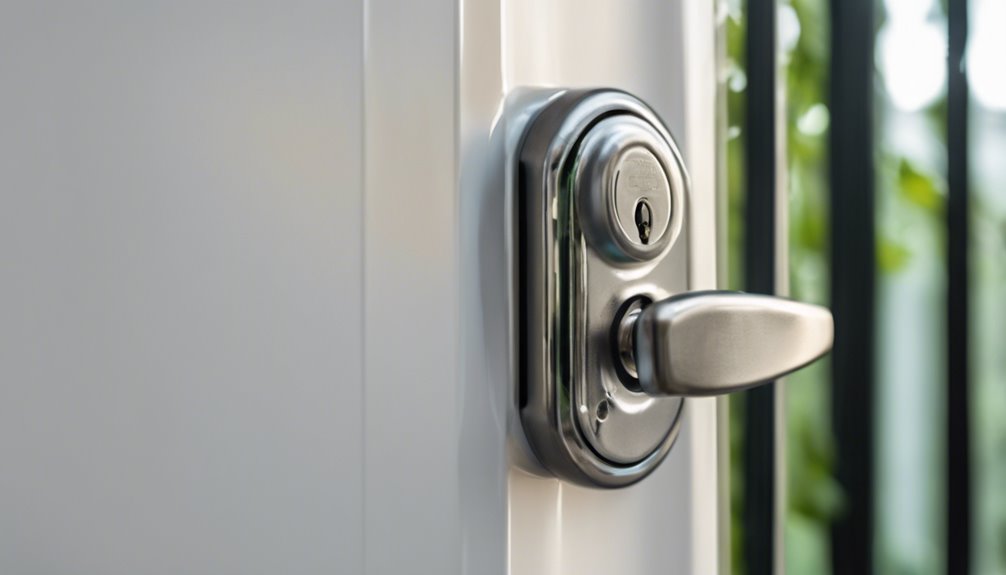
Interior door locks play an important role in securing a home, but effective safety measures extend beyond just doors. Your windows and sliding doors can serve as vulnerable entry points for intruders if not properly secured. New Jersey's safety standards for window and sliding door security offer essential guidelines to protect your property.
For windows, installing guards that meet specific specifications can greatly enhance security. These guards must prevent window openings exceeding 4 inches and block the passage of a solid 4-inch sphere. Made from durable metal or comparable materials, they must also bear a 150-pound load. Proper installation is key, using robust screws that penetrate the window frame adequately. In New Jersey, understanding the legal aspects of lock picking ensures that locksmiths adhere to state regulations when securing windows and doors.
Sliding doors need similar attention. Confirm that the movable section slides inside the fixed section to prevent lifting from its track. Both single and double sliding doors should have vertical bolts securing them at the top and bottom, along with a center locking device that engages firmly. This structure prevents any movement that might compromise security.
Don't forget about additional measures; operable and nonoperable windows should have rated burglary-resisting materials or bars. Focus especially on accessible windows, as they require secure locking devices to thwart unauthorized entry. Locksmith services in New Jersey, like Low Rate Locksmith, provide licensed and insured technicians to ensure compliance with state regulations and enhance overall security.
Common Area Security Regulations
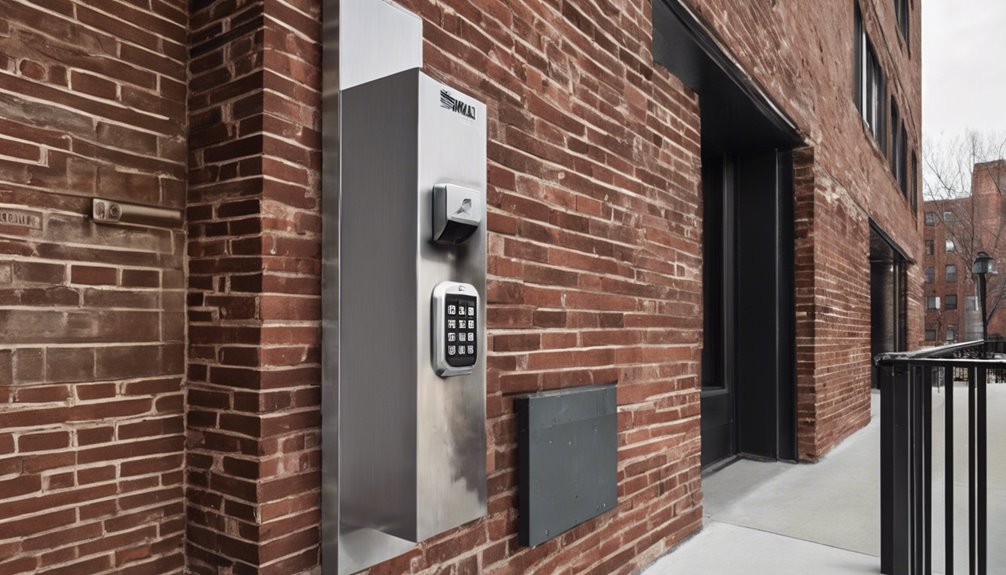
When it comes to common area security, locking requirements play an essential role in protecting residents. You'll find that every exterior entrance door must be self-closing and self-locking to guarantee unauthorized access is minimized. Understanding these specifications helps reinforce the overall security of multifamily buildings and maintains a safe living environment. Locksmith services, such as the 24/7 availability and fast response times provided by Low Rate Locksmith, can be crucial in ensuring that security standards are met promptly. In New Jersey, locksmiths can be integral to the eviction processes, ensuring that locks are changed or rekeyed in compliance with legal requirements during tenant removal.
Locking Requirements Overview
Locking requirements for common areas in New Jersey are designed to enhance security and prevent unauthorized access to residential buildings. These regulations guarantee that residents can feel safe in their living spaces while maintaining their freedom to move within their communities.
Here are three key aspects to take into account:
- Self-Locking Doors: Every exterior entrance door leading to common areas must be self-locking and kept closed, enhancing overall security when not in use.
- Viewing Devices: If visibility from the entrance isn't possible, these doors need to be equipped with a viewing device, allowing you to see who's seeking entry without compromising safety.
- Controlled Access: Access to common areas should be restricted to authorized individuals only. This limits potential threats and guarantees that shared spaces remain secure.
In addition to these security measures, locksmiths in New Jersey should be familiar with employment laws specific to their industry, ensuring compliance with regulations related to wages, working conditions, and rights. These requirements not only establish a safer environment but also reduce the risks associated with unauthorized access. This allows you to enjoy the freedom of your home and community while knowing diligent security measures are in place.
Self-Closing Door Necessity
Understanding the necessity of self-closing doors in common areas is essential for maintaining security and safety standards in New Jersey residential buildings. These doors must be self-closing, lockable, and kept closed except when in actual use. They mitigate unauthorized access to sensitive areas like basements or storage rooms, ensuring safety for all residents.
Local construction officials enforce compliance with these regulations before issuing a Certificate of Occupancy. The Division of Fire Safety and Bureau of Housing Inspection oversee that these self-closing devices meet maintenance standards through regular inspections.
Doors need approved mechanisms listed by recognized testing laboratories while maintaining specific operational criteria, like closing speed and force thresholds.
For added security, self-closing doors should feature viewing devices and chain door guards, allowing partial opening while preventing unrestricted entry. Additional measures, like nonremovable hinge pins and electronic systems, enhance safety further.
Compliance with the New Jersey Uniform Fire Code and ICC/ANSI standards is crucial, ensuring that self-closing doors serve their important role effectively without compromising residents' freedom and safety.
Emergency Access and Egress
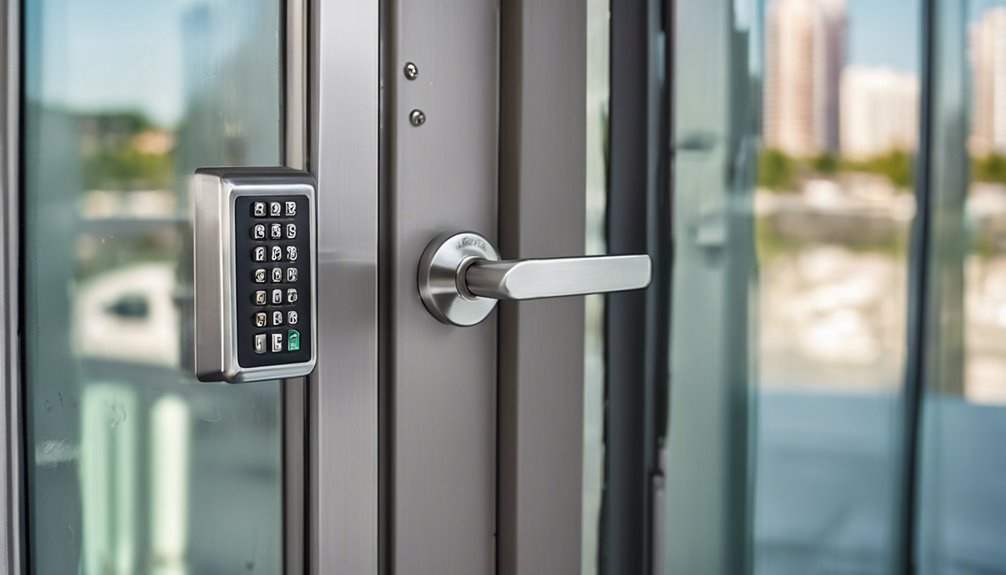
When it comes to emergency access and egress, understanding egress door requirements is essential for safety.
You need to guarantee that doors aren't only easily operable but also properly equipped for quick exits during emergencies.
Additionally, effective communication systems can make a significant difference in coordinating responses when every second counts.
Egress Door Requirements
Egress door requirements are essential for ensuring safe and efficient emergency exits in buildings. They help protect occupants by facilitating a quick and unobstructed evacuation during emergencies.
Here are three key aspects you should know:
- Number of Exits: Rooms with more than 50 occupants or exceeding 75 feet in travel distance must have a minimum of two egress doorways. However, exceptions exist for spaces like storage rooms and classrooms with an automatic sprinkler system.
- Door Functionality: Egress doors must swing in the direction of exit travel for safer egress. They should be equipped with latching devices that can be opened without tools from the inside, ensuring accessibility when it's vital.
- Compliance Standards: All egress doors need to meet specific safety codes, like those outlined in NFPA 101-2012. This includes provisions for panic hardware in high-occupancy areas, reinforcing an always-ready approach to safety.
Staying informed about these requirements not only helps you comply with regulations but also enhances overall safety for everyone in the building.
Emergency Key Access
How can emergency key access systems enhance safety during a crisis? Implementing key lock boxes at your premises can greatly streamline emergency response efforts. By housing essential keys and access codes, these systems guarantee that first responders can quickly and efficiently access critical areas during emergencies, like mechanical rooms or areas housing fire-suppression equipment.
In New Jersey, certain premises are mandated to install these lock boxes, especially if they've automatic fire alarms or are classified as "life hazard uses." This compliance not only aligns with safety regulations but also becomes instrumental in preventing delays when every second counts.
Each key lock box should contain two sets of keys and critical documents, like floor plans and emergency contacts, allowing for thorough preparedness.
Additionally, integrating a tamper switch with the building's security system enhances security measures further. The Fire Chief or Fire Official designates the type and location of these systems, guaranteeing a tailored approach that fits specific building needs.
Communication During Emergencies
Effective communication during emergencies greatly enhances overall safety in any building. You need systems in place that facilitate quick and effective responses. This guarantees occupants can access help and egress safely. Here are three critical elements to guarantee effective communication:
- Intercommunication Systems: Install systems that let residents communicate with the main entry. This is crucial for relaying emergencies without delay.
- Panic Hardware: Verify emergency exit doors, especially in larger buildings, feature approved panic hardware. This allows people to exit quickly during crises.
- Central Alert Systems: For small buildings, at least one doorbell in common areas guarantees that emergencies can be signaled to all occupants.
Additionally, understanding egress requirements is fundamental. All locks on egress doors must function without keys. They should be well-maintained and must open effortlessly from the inside.
Make sure there's a clear pathway, free of obstructions. Furthermore, integrating these systems with smoke detectors can activate release mechanisms, further enhancing safety.
Emphasizing communication during emergencies isn't merely a rule; it's a pathway to freedom from fear and chaos in dire situations.
Additional Security Measures
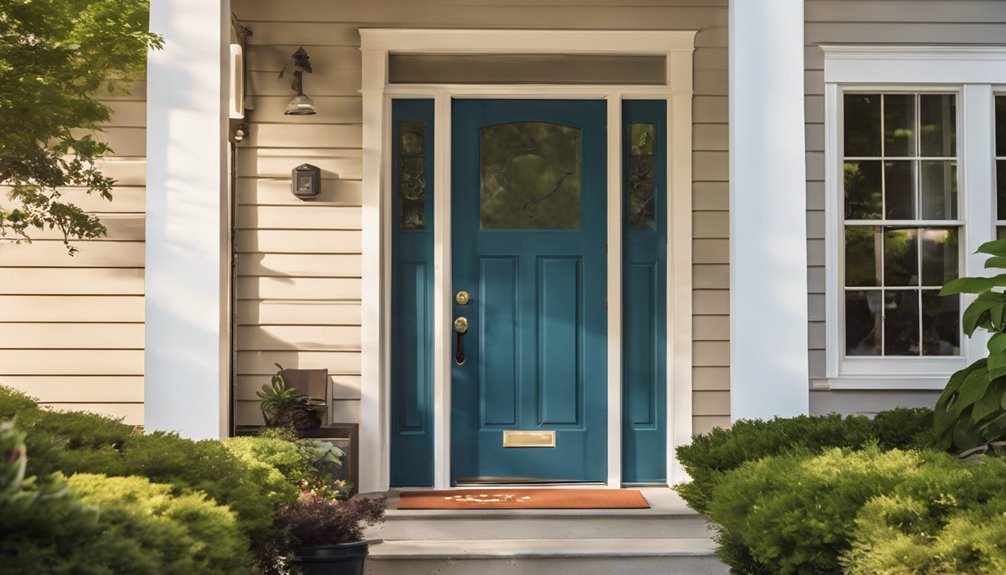
While basic locking mechanisms are essential for security, implementing additional measures can greatly enhance the safety of both residents and properties. You can start by verifying that exterior doors are equipped with heavy-duty dead latching locksets and securing all openable windows and sliding doors with reliable locking devices. Non-removable hinge pins on exterior and entrance doors also add an extra layer of protection against tampering.
Access control systems further bolster safety. Consider integrating buzzer and latch-release systems for multi-unit buildings, coupled with an intercommunication system to facilitate communication. The installation of self-closing and self-locking entrance doors to common areas minimizes the chances of unauthorized entry, while the use of chain door guards on dwelling units allows for safe partial opening without compromising security.
Don't overlook the importance of viewing devices on main entrance doors, as they enable you to identify visitors before granting access. In terms of key management, residents should have access to their keys free of charge, but confirm that master keys are securely held and used only in emergencies. Keys marked "do not duplicate" should be restricted from copies, safeguarding against unauthorized replication.
Regularly audit key management systems to keep track of issued keys. Lastly, establish a clear policy that entrance doors to living areas must remain locked when not in use, with staff responsible for monitoring access. By layering these additional measures, you drastically improve the security framework while promoting peace of mind for all residents.
Importance of Self-Locking Mechanisms
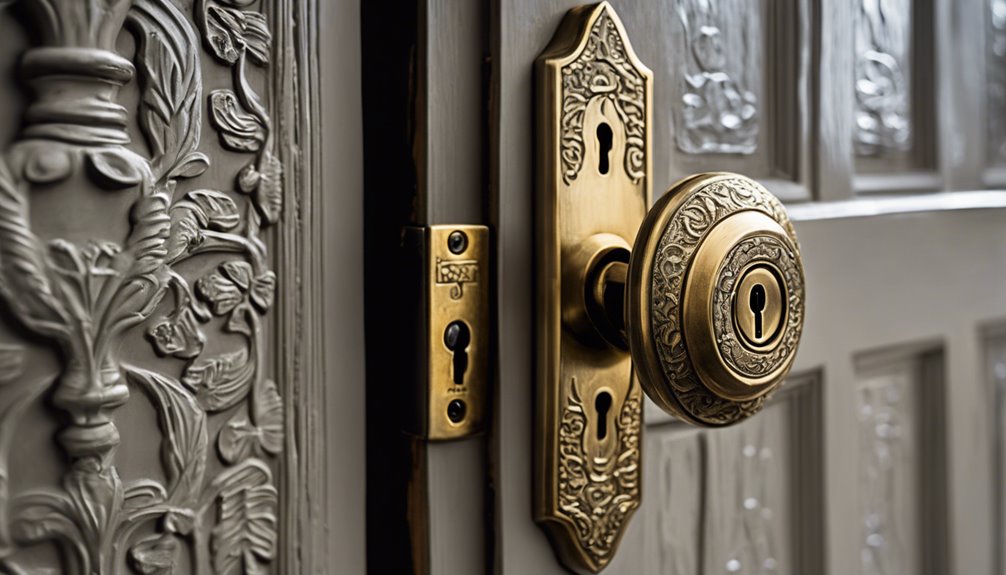
Understanding the importance of self-locking mechanisms is essential for ensuring both security and safety in residential properties. These mechanisms play a vital role in facilitating emergency egress while preventing unauthorized entry, thereby balancing freedom and safety within your living space.
Here are three key advantages:
- Quick Exit During Emergencies: Self-locking doors provide seamless egress without the worry of being obstructed by additional locking mechanisms. In emergencies, you can rely on these doors to open freely, ensuring that you and others can evacuate swiftly if necessary.
- Enhanced Security: These mechanisms automatically lock once the door is closed, reducing the risk of unauthorized access. This feature allows you to feel more secure in your environment, knowing that your property is protected without compromising your ability to exit quickly.
- Regulatory Compliance: Adhering to safety standards requires that all exit doors aren't inhibited by traditional lock designs such as chain locks or padlocks. Self-locking mechanisms meet these guidelines, contributing to a secure yet accessible living space.
Incorporating self-locking mechanisms into your residential property not only enhances security but also promotes a safe environment.
Compliance and Enforcement
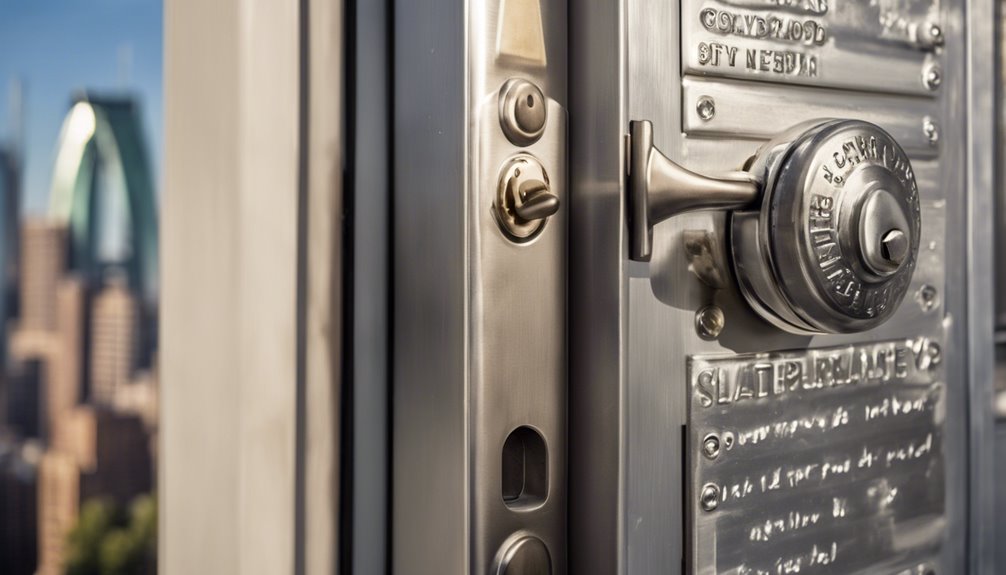
Compliance with safety standards for locks is imperative for the security and accessibility of residential properties. New Jersey mandates specific requirements for locking mechanisms, guaranteeing they meet a defined standard. Entrance doors must equip medium-duty, dead-latching locksets or deadbolt locks, each with specific measurements that enhance security.
In addition, all exterior doors to common areas in multiple dwellings must be self-closing and self-locking, reinforcing safety without requiring constant attention.
The enforcement of these standards falls under the purview of the Commissioner of the Department of Community Affairs, who oversees compliance through construction officials and subcode officials. These entities review plans and conduct field inspections, verifying that lock installations adhere to the Uniform Construction Code (UCC).
Local enforcing agencies handle routine inspections, while the State may oversee plan reviews for larger structures like casinos or hospitals.
The inspection process is significant; officials examine construction permit applications to verify compliance and conduct final inspections to confirm that all requirements, including those for door assemblies and locks, are met.
It's imperative to maintain locks in good working condition, as neglect can lead to enforcement actions.
Should you fail to comply with the UCC regulations, you risk penalties, including possible legal action. Violations are officially documented, and it's the responsibility of the permit holder to correct any discrepancies.
Choosing the Right Lock Systems
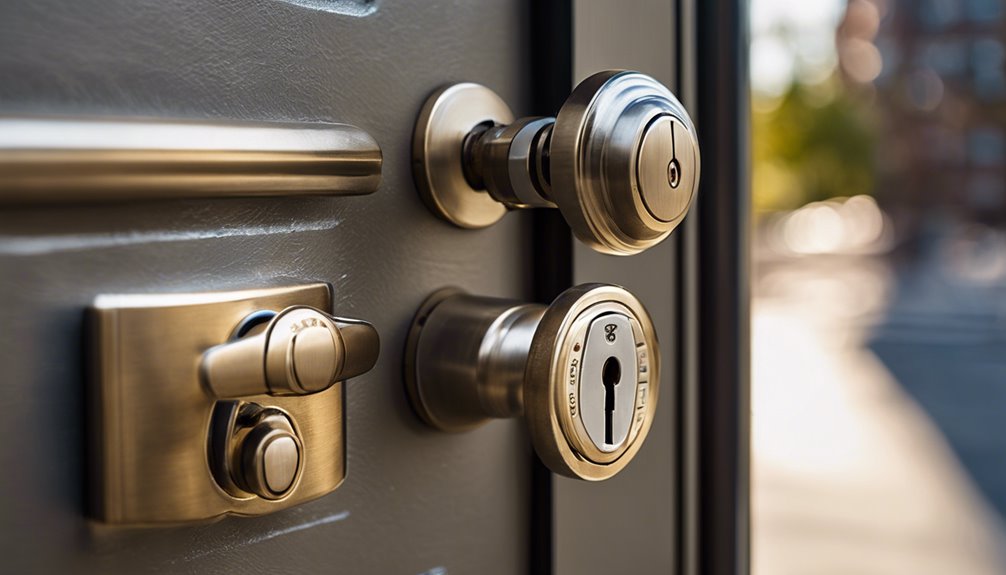
When selecting a lock system, understanding the various lockset types is essential for ideal security.
You'll want to take into account key security features that enhance safety, such as deadbolts with robust throw lengths and dead-latching mechanisms.
Lockset Types Explained
Selecting the right lock system for your home or business is essential for ensuring security and functionality. Different locksets serve varying purposes, so it's important to choose one that meets your specific needs.
Here are three key types of locksets to evaluate:
- Entry Lockset: Ideal for main doors, featuring both a manual locking mechanism and key access. It often includes a deadbolt for enhanced security.
- Privacy Lockset: Commonly used for bedrooms and bathrooms, this type allows you to lock the door from the inside while still permitting emergency access with a release key.
- Dormitory Lockset: This system is perfect for commercial settings, ensuring doors stay locked unless accessed with a key. It provides an added layer of security for sensitive areas.
When deciding on lock systems, reflect on your security requirements, door types, and user access needs.
Each lockset type offers distinct features that can enhance both safety and convenience in your environment. An informed choice will empower you with confidence in your security setup.
Key Security Features
Choosing the right lock system goes beyond just understanding the different types of locksets; it involves a thorough evaluation of key security features that align with your unique needs.
Start by evaluating the specific requirements of your property—whether it's commercial or residential—and the value of what's inside. High foot traffic areas may require more robust solutions, while local crime rates can guide your decision-making.
Next, invest in quality locks that meet industry standards, like ANSI/BHMA ratings. Select locks made from durable materials designed to resist forced entry.
Consider advanced features, such as smart locks with remote access and real-time monitoring. Biometric authentication methods—like fingerprint scanners—can bolster your security further.
Integrating lock systems with your broader security setup enhances protection. Routines that automatically lock or open based on your presence add convenience and safety.
It's also wise to look for locks that offer auto-locking mechanisms and user-customizable access privileges. Such measures guarantee that your freedoms remain intact, while you maintain control over your property's security.
Making informed choices in these areas can create a secure environment tailored to your lifestyle.
Frequently Asked Questions
What Options Are Available for Upgrading Existing Locks?
When upgrading existing locks, you've got several smart options.
Keyless entry systems offer convenience with keypad or biometric access.
For enhanced security, consider electronic door locks like maglocks or mortise locks.
Integrating access control systems can further increase your security by allowing monitored entry.
Evaluate your specific needs and consult with professionals to choose locks that fit your lifestyle and provide peace of mind, ensuring your home or business is well protected.
How Can I Ensure My Locks Are Compliant With New Jersey Standards?
To guarantee your locks are compliant, start by reviewing the specific requirements for the types of locks used in your property.
Check that they meet quality standards, like being medium or heavy-duty, and ascertain they're easily operable from inside and outside.
Additionally, assess whether your entrance doors have self-closing features and that all access points are secure.
Regularly inspect and maintain your locks to keep them functioning effectively and in line with regulations.
Are There Penalties for Failing to Meet Lock Safety Standards?
Failing to meet safety standards for locks can feel like leaving your front door wide open.
You risk hefty penalties, often amounting to thousands of dollars per violation. Each lapse could lead to daily fines or punitive actions, especially if your non-compliance poses a significant hazard.
It's crucial to prioritize adherence to regulations, as the consequences not only strain your finances but can also threaten your freedom to operate safely and securely.
Who Monitors Enforcement of Lock Safety Regulations in New Jersey?
In New Jersey, various agencies monitor enforcement of safety regulations, including local enforcing agencies and the Bureau of Housing Inspection. Their duties involve conducting inspections, issuing penalties for non-compliance, and ensuring adherence to safety standards.
Municipal construction officials also play a vital role by acting as agents for inspections of newly constructed or altered buildings.
Can Tenants Request Lock Changes for Their Units?
Think of your home as your personal fortress; you should feel safe within it.
Yes, you can request lock changes for your unit, especially if you're facing safety concerns. If you have a restraining order, your landlord must act swiftly, changing the locks within 48 hours of your written request.
Just remember to notify them afterwards and provide new keys, keeping that fortress secure and your freedom intact.
Conclusion
In maneuvering New Jersey's safety standards for locks, you're not just ensuring compliance; you're safeguarding lives. Imagine returning home one evening, confident that your locks, designed for security, have kept potential threats at bay. By investing in heavy-duty dead-latching mechanisms and adhering to regulations, you're creating a haven for yourself and your neighbors. Ultimately, these choices protect your loved ones and foster a sense of community, reminding us all that safety isn't just a requirement—it's a shared responsibility.

